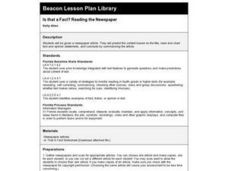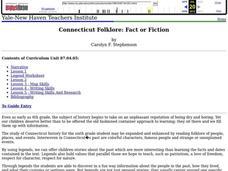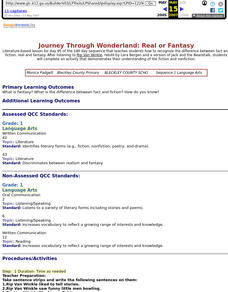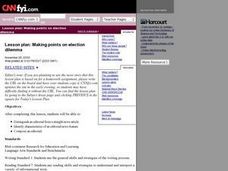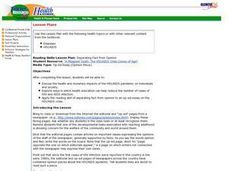Curated OER
Family Life
What is family? Challenge your scholars to write an encompassing definition of what this word means to them. After reading "It May Be a Family Matter, But Just Try to Define Family," class members discuss the emotional issues surrounding...
San Francisco Symphony
Mr. Lincoln Through the Eyes of Aaron Copland
Use Aaron Copland's symphonic piece, "Lincoln Portrait" to engage learners in a cross-curricular experience. They'll listen to the piece, watch a video, read the Gettysburg Address, and write a series of fact or opinion sentences. An...
EngageNY
Author’s Read: Final Performance Task
Scholars submit their final performance task, a letter to a publisher about an athlete's legacy. As a culminating activity, they share their work with classmates in small groups.
Curated OER
Turning Literature into News
Students examine the newspaper. In this writing purposes lesson, students read the newspaper and discuss the purpose: to inform, entertain and persuade. Students identify facts and opinions. Students write an article and discuss acts of...
Curated OER
Editorials- Facts that Support Opinions
Fourth graders complete a worksheet. In this author's opinion activity, 4th graders read editorials and determine how the use of facts supports the author's opinion. Students complete a facts to support opinions chart.
Curated OER
Nonfiction Text Features
Identify features of a nonfiction article in this language arts lesson. Middle schoolers apply comprehension strategies as they read the parts of the article, and analyze the author's key points. Additionally, they examine information in...
Curated OER
Is that a Fact? Reading the Newspaper
Fourth graders are given a newspaper article. They predict the content based on the title, read and chart fact and opinion statements, and conclude by summarizing the article. They utilize a worksheet imbedded in this plan to guide their...
Curated OER
Whose Neighborhood is It? Whose America is This?
Students use electronic resources to study immigration issues, analyze immigration issues dealing with security, economics, lawfulness, culture, and human rights, and discuss possible solutions. Students then express their opinions by...
Curated OER
Mr. Lincoln's Whiskers
Learn about the events that helped shape the United States of America. Elementary schoolers explore the Civil War with six different activities. Each activity has a different focus: literature connections, primary sources, vocabulary,...
Curated OER
Is That a Fact?
Third graders listen to a paragrah as it is read and write down points that they think are important. They answer several comprehension questions to check for understanding of the passage. They then read pages in their science text book...
Curated OER
Connecticut Folklore: Fact or Fiction
Sixth graders read legends to learn the history of Connecticut in a fun informative way.
Pennsylvania Department of Education
Analyzing Key Ideas and Details in Nonfiction
Students explore nonfiction texts. In this language arts lesson, students read a nonfiction text and make predictions. Students identify facts and opinions in the text and draw conclusions as they read.
Curated OER
Journey Through Wonderland: Real or Fantasy
First graders recognize the difference between fact and fiction, real and fantasy. After listening to Rip Van Winkle, retold by Lara Bergen and a version of Jack and the Beanstalk, 1st graders demonstrates their understanding of fiction...
Curated OER
Trap Door Reading: Persuasive Text
Young scholars create T-charts to analyze persuasive text. In this persuasive text instructional activity students make predictions based upon titles and learn how to make arguments based on facts.
Curated OER
Good News/Bad News/Who Cares?
Students practice evaluating facts, bringing to bear their own experience, preferences, and international contexts. They recognize that there are many ways of interpreting a single piece of information and form the habit of reflecting...
Curated OER
The Adventures of Huckleberry Finn: Problematic Situation
Individuals read a series of passages from The Adventures of Huckleberry Finn, rank the statements from the least to the most racist or stereotypical, and share their rankings and rationales in small groups before a whole class...
Curated OER
Making Points on Election Dilemma
Students define a straight news article, and identify characteristics of an editorial news feature. They read a CNN article that examines the 2000 presidential election, and determine what is factual and what is opinion.
Curated OER
Equal Protection of the Law: Fact or Fiction
High schoolers focus on the 14th Amendment of the Bill of Rights to decide whether or not racism denies citizens of their rights under the amendment. They watch a movie, Every Two Seconds and complete a worksheet (included in the plan)...
Beyond Benign
Medical Ethics
Just because we have the ability to determine an organism's traits through genetic testing, should we do it? Middle-school medical experts examine the ethical dilemmas in biotechnology in the 18th and final installment in a series of...
Curated OER
Separating Fact from Opinion
Students read, "A Misspent youth: The HIV/AIDS Crisis Comes of Age", and discuss the article or write their answers to the questions imbedded in the lesson. They write their own essay.
EngageNY
TASC Transition Curriculum: Workshop 12
How can opinions slant facts? Workshop participants learn how to examine primary and secondary sources and identify the author's point of view. They also examine how visual art impacts the meaning and rhetoric of sources. Full of...
State Bar of Texas
Baker v. Carr
Can the federal government override the state government to protect the citizens of the United States? The 1962 Supreme Court case Baker v. Carr outlines the issue of equal protection under the law. Scholars investigate with a short...
State Bar of Texas
Wisconsin v. Yoder
How far does freedom of religion truly go? The 1972 Supreme Court case Wisconsin v. Yoder introduces the concept of the free exercise clause of the First Amendment. Individuals examine the case with a short video and open discussion. To...
EngageNY
Editing Sentences and Creating Visual and Multimedia Displays for a Presentation
Let's get visual. Pupils plan visual displays to accompany their upcoming opinion speech presentations. Additionally, they practice editing sentences for clarity before revising their speech drafts.








